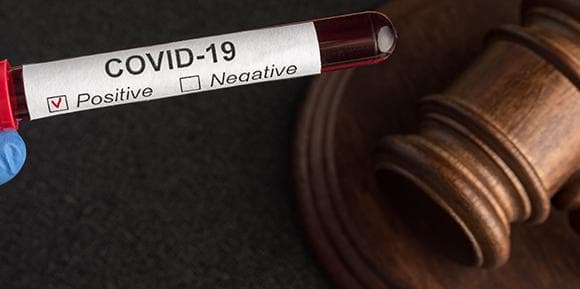
Throughout the course of the pandemic, citizens of the District of Columbia celebrated our essential workers for putting their lives on the line to keep the world turning. Unfortunately, DC’s public workers’ compensation system did not join in on the celebration as it failed to create a fair and proper safety net for those who contracted COVID-19 on the job.
Background
The District of Columbia has two completely separate workers’ compensation systems – one for injured public workers and one for injured private workers. Prior to the pandemic, the public sector workers’ compensation system has been inferior to the private sector workers’ compensation system. For example, unlike private workers, public workers cannot: (1) receive total disability benefits; (2) receive benefits for psychological injuries; and (3) select their own treating doctor.
Determination of Compensability
In the private system, employees are given a presumption that the infection occurred while at work. The private employee need only: (1) allege a work-related injury; (2) make an initial demonstration of an injury; and (3) show that a work-related activity has the potential of resulting in or contributing to the injury. “Once this is met, the [private employee] is entitled to a statutory presumption of compensability.”
In contrast, public employees must prove an infection resulted from work-related activities. To determine compensability, a public employee is subjected to a tiered risk evaluation to determine the probability of a work-related exposure. Meaning, employees who have a job with a high risk for exposure have the benefit of a rebuttable presumption that the infection was work-related. However, this presumption can very easily be rebutted “by producing sufficient evidence to establish that the employee more likely than not contracted the virus from a source outside of work.” This rebuttable presumption opens the door for the DC government to further violate a public employees privacy. It makes questions about day to day activities and ongoing relationships relevant and required to determine compensability. Further, this invasion of privacy will likely draw out a claim for weeks, if not months.
All the while those working in jobs that are medium or low risk have the burden of proving (1) a direct causal connection between the work conditions and the exposure, and (2) circumstances of employment that aggravate the risk of contracting COVID-19 as compared to the attendant risk of contraction during routine interactions in the broader society in a time of widespread community infection. The public-sector system provides neither definitions nor examples of what constitutes an aggravating circumstance. It also does not provide any standard for how to show a direct causal connection. Further, an employee will not have access to data showing that a higher percentage of people contracted COVID-19 in the general population. These vague requirements make it extremely difficult for a public worker to receive the benefits that they may desperately need, especially without the assistance of a lawyer.
Workers’ compensation is designed to provide needed assistance to all workers regardless of a public or private-sector designation and should be equally accessible. The disparate treatment between public and private-sector employees in the District of Columbia is unforgiving. Join Lightfoot Law, PLLC in demanding a change in compensation policies! Call or email Councilmembers Robert White at rwhite@dccouncil.us | (202)-724-8174 and Phil Mendelson at pmendelson@dccouncil.us | (202) 724-8032. Tell them to reintroduce the Injured Workers Equality Act!
And if you believe that you contracted COVID-19 while at work, please contact us for a free consultation at (202) 919-5453or info@maylightfootlaw.com
Written by: Amanda Townsend and Vendette Parker
Citations:
District of Columbia, Office of Risk Management, PSWCP 2020-01
Washington, D.C. Workers’ Compensation Covid-19 Quick Guide, A. Randell, Jr., USLaw Network, 2020